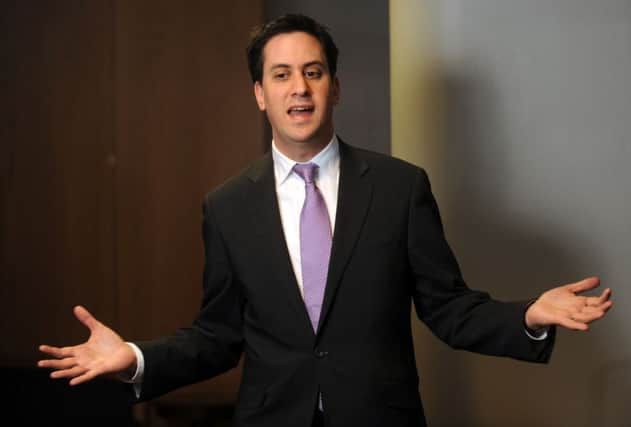Leaders: Miliband takes up the Union baton


It will be interesting to see what impact the arrival of Labour leader Ed Miliband and his shadow cabinet have today.
After counter-productive trips north by the likes of Chancellor George Osborne and Defence Secretary Philip Hammond, whose warnings on currency and security were of the doom and gloom variety, Miliband and his team promise to argue a positive case for social justice. And they will reiterate their pledge that a No vote will mean a more powerful devolved Scottish Parliament.
Advertisement
Hide AdAdvertisement
Hide AdThe mass intervention of senior Labour MPs marks a distinct change of plan by the Better Together campaign which, until now, has tried to maintain a balance between member parties.
This change of plan probably makes sense for them. It is neither Conservative nor Liberal Democrat voters who will decide the outcome of the referendum but Labour supporters.
Already one in five who traditionally vote Labour are minded to vote Yes. The others are being assiduously wooed by the SNP, most recently in conference speeches by First Minister Alex Salmond and his deputy Nicola Sturgeon. Both suggested that a Yes vote would revitalise Scottish Labour. It was a chance, said Sturgeon, for Labour members to take back their party.
Labour politicians may have dismissed those SNP overtures as cynical but they represented clever campaigning.
In reply, Labour has begun to stamp itself all over the No campaign. This week, debate over the implications for pensions wasn’t led by a Tory minister but by former prime minister Gordon Brown.
Miliband and his colleagues’ trip north consolidates Labour’s new dominance of the Better Together campaign. They enter the fray as the Yes campaign appears to be on the rise. The No campaign’s lead has dwindled to as little as four points according to our most recent poll.
Miliband and his Labour team will have to deliver a convincing, positive case for the Union.
Not only that, Miliband will have to leave the impression that he is a credible threat to David Cameron in 2015.
Advertisement
Hide AdAdvertisement
Hide AdThe SNP’s warning that a No vote risks eternal Tory government at Westminster strikes a chord with some Scots. A huge challenge for Miliband will be to reassure those voters that they may vote No, safe in the knowledge that his party will win the next general election.
That is no small task for the leader of the opposition, whose personal approval ratings are some ten points lower than the Prime Minister’s.
The next 48 hours will be a considerable test of Ed Miliband’s abilities. His ability to convince is far from certain.
Breast is best message getting home
IT IS a depressing truth that campaigns to improve public health too often have little effect.
Though successive governments have encouraged us to change our habits, Scotland remains a nation that eats, drinks, and smokes too much and any progress in improving health has been painfully slow.
So it is a particular pleasure to note that an important health campaign has had positive results.
An attempt to increase breast feeding rates among mothers from disadvantaged backgrounds has been a roaring success. A University of Edinburgh study shows that mothers with few or no qualifications are increasingly likely to breastfeed for longer.
Researchers compared the habits of mothers who give birth in 2005 and 2011 and concluded that policies supporting the practice have had a positive impact.
Advertisement
Hide AdAdvertisement
Hide AdBabies who are breastfed are less likely to suffer a number of illnesses, including chest infections and childhood diabetes. They are also less likely to become obese in later life.
And there are health benefits for mothers, too, including a reduced risk of breast and ovarian cancer.
Health minister Michael Matheson welcomed the findings as encouraging.
But he must recognise there is more to do.
Despite the increase in the period of time that mothers from disadvantaged backgrounds feed their babies naturally, breastfeeding is still the long-term choice for fewer than half of Scottish mothers, 20 years after a 50 per cent target was first set. There is still more work to be done to ensure more children get the best start possible.